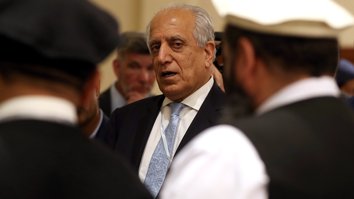KABUL -- US Special Representative for Afghanistan Reconciliation Zalmay Khalilzad was in Kabul Wednesday (December 4) for talks on peace with Afghan government officials before heading to Doha for renewed negotiations with the Taliban.
In Kabul, Khalilzad, Afghan government officials and other Afghan leaders sought "to discuss how best to support accelerated efforts to get all parties to intra-Afghan negotiations", according to a statement from the US Department of State.
In two separate meetings, Khalilzad conferred with President Ashraf Ghani and Chief Executive Abdullah Abdullah December 4 in Kabul.
Ghani and Khalilzad discussed the issue of a ceasefire with the Taliban, according to a statement released by Ghani's office December 4.
![President Ashraf Ghani holds talks with US Special Representative for Afghanistan Reconciliation Zalmay Khalilzad (top right of table) December 4 at the Presidential Palace. [Afghan Presidential Palace/Facebook]](/cnmi_st/images/2019/12/05/21249-ghani-585_329.jpg)
President Ashraf Ghani holds talks with US Special Representative for Afghanistan Reconciliation Zalmay Khalilzad (top right of table) December 4 at the Presidential Palace. [Afghan Presidential Palace/Facebook]
![US peace negotiator Zalmay Khalilzad confers with Chief Executive Abdullah Abdullah December 4 in Kabul. [Dr. Abdullah Abdullah/Facebook]](/cnmi_st/images/2019/12/05/21250-khalilzad-585_329.jpg)
US peace negotiator Zalmay Khalilzad confers with Chief Executive Abdullah Abdullah December 4 in Kabul. [Dr. Abdullah Abdullah/Facebook]
His visit comes less than a week after US President Donald Trump flew to Afghanistan and gave his blessing for a return to negotiations.
In Doha, Khalilzad "will rejoin talks with the Taliban to discuss steps that could lead to intra-Afghan negotiations and a peaceful settlement of the war, specifically a reduction in violence that leads to a ceasefire".
In a nod to concerns raised by Ghani, the US State Department voiced support for a ceasefire -- which the Taliban have long rejected and which did not figure in a draft accord that Khalilzad earlier reached with the insurgents.
In September, the United States and the Taliban had appeared on the verge of signing a deal that would have seen Washington begin pulling thousands of troops out of Afghanistan in return for promises to keep out foreign extremists.
It was also expected to pave the way toward direct talks between the Taliban and the government in Kabul and, ultimately, a possible peace agreement after more than 18 years of war.
But that same month, Trump withdrew an invitation to the insurgents to meet in the United States after the killing of 12 people, including an American soldier, in Kabul.
During a surprise visit to an American military base in Afghanistan on November 28, Trump said the Taliban "wants to make a deal".
The Taliban later said it was "way too early" to speak of resuming direct talks with Washington.
Signs of co-operation
The Taliban have steadfastly refused any halt to their grisly campaign of violence, which they see as leverage.
But even during the stall in talks, Khalilzad has seen signs that the Taliban is ready to co-operate.
He recently helped arrange a prisoner swap involving three Haqqani Network commanders and two American University of Afghanistan (AUAF) professors, whom the Taliban had held hostage for three years.
And in an indirect dovetailing of interests that was noted favourably by Khalilzad, both US and Afghan forces -- as well as the Taliban -- have been battling the "Islamic State of Iraq and Syria"'s Khorasan branch (ISIS-K).
Progress against ISIS-K
Afghan forces recently announced the complete defeat of ISIS-K in Nangarhar Province.
"ISIS-K hasn't been eliminated but this is real progress," Khalilzad wrote on Twitter, noting "effective operations" by US-led, Afghan government and Taliban fighters.
Khalilzad also has kept visiting nations seen as vital to Afghan peace, including Pakistan.
In early October, a group of senior Taliban members received a warm welcome from Pakistani officials in Islamabad, where Pakistani Foreign Minister Shah Mahmood Qureshi called for the resumption of Afghan peace talks.
Weakened after the collapse of US-led peace talks in early September, factions of the Taliban have sought support from questionable allies.
On September 13, three Taliban officials held talks with Russia's special envoy for Afghanistan, Zamir Kabulov, in Moscow.
Russia's Foreign Ministry and the state-funded news agency RIA Novosti confirmed the meeting, but Taliban social media accounts made no mention of it, indicating the group wanted to downplay the event.
Last week, Tehran hosted a Taliban delegation ostensibly to discuss efforts aimed at finding a negotiated settlement to the Afghan war.
But given Iran's military, financial and logistic support for the Taliban, it is difficult to believe the regime's honest intentions for Afghan reconciliation.
Rising hopes for reconciliation
An annual survey by the San Francisco-based Asia Foundation released this week found overwhelming support for making peace with the Taliban.
The poll said that 88.7% of the 17,812 Afghans surveyed either strongly or somewhat supported reconciliation efforts.
A majority -- 64% -- thought peace could be achieved. That was a 10-percentage-point increase from a year earlier, although women -- whose rights were severely curtailed under the Taliban's 1996-2001 regime -- were more sceptical.

![President Ashraf Ghani speaks to US soldiers as US President Donald Trump listens during the presidents' surprise visit to Bagram Airfield on November 28. [Olivier Douliery/AFP]](/cnmi_st/images/2019/12/05/21244-000_1mn992-585_329.jpg)






